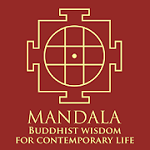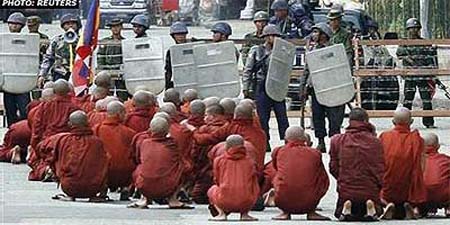
|
|
|
Home Asia Pacific South East Asia Myanmar Myanmar Protest News Odds Against Monks Facing Myanmar TroopsBy DENIS D. GRAY, AP, September 28, 2007BANGKOK, Thailand -- Confronted by a military junta willing to pull the trigger, Buddhist monks and democracy activists in Myanmar face long odds in trying to uproot an institution that has wielded absolute power for 45 years.
The world has changed in many ways since 1988. The Iron Curtain fell a year later, showing freedom can emerge if authoritarian regimes aren't ruthless. Globalization brought increasing economic integration to Asia, including investment in a poor place like Myanmar. The Internet has made it increasingly difficult for governments to control information and dissent.
"The risk of not cracking down is infinitely greater than risk incurred in cracking down," said Mary Callahan, an expert on Myanmar at the University of Washington. "What we've seen in the last two days is a very clear message they are moving to put down what they consider a threat to the nation." The protests began more than a month ago, involving a few hundred activists who used a sudden increase in fuel prices as their catalyst. The regime uncharacteristically allowed the demonstrations to escalate, and by Monday some 100,000 people led by Buddhist monks were in the streets of Yangon, the country's largest city. First came official warnings, then a curfew, and on Wednesday and Thursday the army finally flexed its muscles, sending its soldiers to beat demonstrators, arrest monks and political opponents and shoot into some crowds, killing several people. Typically, the junta blames the protests on a conspiracy by "domestic and external elements," meaning the West and those in Myanmar who look to its support in the demand for civilian rule. The military trots out a motto underlining a different value system — "peace, stability, unity." By Myanmar standards, the crackdown so far has been muted. Though the military will not be satisfied until it has won, several restraining forces may be at work that would prevent a replay of 1988 and indicate some willingness to make compromises later. One is the rise of neighboring China — the regime's leading trade partner and military supplier. Beijing has recently made low-key but telling statements urging the rulers to reconcile with the opposition and restore stability. Some analysts say Beijing would hate to be viewed as party to a bloodbath as it prepares to host the 2008 Olympic Games, a sort of coming-out party for China after the bloody crushing of the Tiananmen Square democracy movement in 1989. Support from China — and to a lesser extent other Asian nations investing in Myanmar, notably India, South Korea and Singapore — has undercut the effectiveness of economic sanctions imposed by the U.S. and other Western nations. Another mitigating factor is the prominent protest role of Myanmar's monks, who outnumber the military 500,000 to 400,000. They are highly revered in the deeply Buddhist nation, and the regime knows killing them in large numbers could trigger a maelstrom of fury. "Will the soldiers shoot at the Buddha? Or will the generals try something else this time? A `straightforward massacre' as in 1988 may not be possible this time," said Bertil Lintner, a Myanmar expert and author of a book on that uprising two decades ago. The military does have a new card to play: Its policemen and soldiers have been better trained in riot control and the use of non-lethal force, Myanmar journalists say. The protests, meanwhile, have failed to produce a visible leader for anti-junta forces to rally around. The iconic democracy activist and Nobel Prize winner, Aung San Suu Kyi, remains under house arrest while others are jailed or have fled abroad. The only opposition party — Suu Kyi's decimated National League for Democracy — has shown no initiative over the past month. Although monks have been spearheading the demonstrations and filling most of the ranks in protest marches, they aren't likely to emerge in a leadership role, Lintner said. "They can mobilize the people, get them to rise up, but as monks they cannot provide political leadership," he said. "It's in a sense leaderless and rudderless. No one can bring (the protests) forward, to come up with specific demands. The monks can take the moral high ground, but not more than that." Some experts think that once the unrest is quelled, the regime may be willing to take some conciliatory steps, depending on the intensity of pressure from China, the United Nations and others in the world community as well as from within. These could include speeding up work on drafting a constitution, already a decade old, and holding a referendum and election along a so-called "roadmap to democracy." The regime also could open talks with Suu Kyi and her party. But there are no signs the generals, ensconced and safe in the remote new bunker-like capital of Naypyitaw, intend to relinquish any of the real power they have held since the last civilian government was toppled in 1962. Questions have been being raised about whether soldiers — who are virtually all from the Buddhist ethnic Burman majority — would defy the taboo on mistreating monks and other countrymen. Most Burmese males spend at least a token few weeks as monks as a show of devotion. However, there are no signs of cracks among the military's rank and file. Soldiers have shown no sympathy for protesters, and none has changed sides as happened in 1988 when some air force personnel joined demonstrations. Troops are kept isolated in barracks; their families get free housing and medical care. "Judging from the nature and habit of the Myanmar military, they will not allow the monks or activists to topple them," said Chaiyachoke Julsiriwong, a Myanmar scholar at Chulalongkorn University in Bangkok. "They will fight at all costs because these people have grown to believe they are only institution that can uphold the nation's security. They think of themselves as the center of the nation." ----------------- |
 Get your Korean Buddhist News here, brought to you by BTN-Buddhist Channel |
 |
 The Mandala app brings together Buddhist wisdom and meditation techniques with the latest insights of psychology and neuroscience to handle the challenges and complexities of modern life. The App offers a series of engaging talks and conversations with experts on a wide variety of topics, such as managing stress, dealing with adversity, developing greater resilience, cultivating empathy and compassion, creating healthy relationships, and many more. These topics are explored to help find greater peace, meaning and joy in our lives. Our panel of experts include Dr, Thupten Jinpa, Daniel Goleman, Kelly McGonigal and others.FREE DOWNLOAD here |
| Point
your feed reader to this location |
| Submit an Article |
| Write to the Editor |

 Every sign of dissent over the decades has been crushed, including a major uprising in 1988 that ended when troops gunned down thousands of peaceful demonstrators and imprisoned the survivors.
Every sign of dissent over the decades has been crushed, including a major uprising in 1988 that ended when troops gunned down thousands of peaceful demonstrators and imprisoned the survivors.